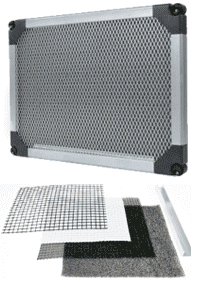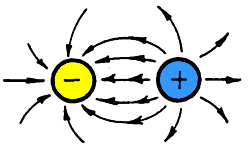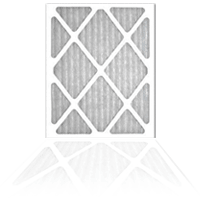
More Articles

Reading some of the advertisements for electrostatic air filters you'd think that they would be a perfect choice. But there's more to it.
An electrostatic air filter collects particles on the principle that the filter is charged one way and the dust particles are charged the other way, causing the dust particles to stick to each other. (opposites attract).
In practice this works well.
The problems are when the surfaces of the electrostatic air filter are coated in dust. New dust now coming through the filter doesn't stick that well.
Still, you can pull out the filter, wash it off and now it's back in business attracting dust again.

The time it takes an electrostatic filter to become nearly useless can be very short, as soon as a couple of weeks or it might last a month or so. It all depends on where you live. If you purchase an electrostatic air filter you should check it every week until you get an idea of how often yours needs to be washed.
So the major problem of electrostatic air filters is forgetting to wash them in a timely manner.
Forgetting to wash them can cause the system to get covered in dust, which can stress the components, causing early failure, increase allergies for those affected and cause dirt to blow out of your vents.

Which type of filter should I use?
The safe answer to that is "The one the manufacture of your HVAC system tells you to use".
The problem with this is that typically, HVAC system filters are not there for your comfort, they are there to keep dirt/dust off system components so they don't fail - not to provide you with highly filtered air.
Electrostatic air filters usually do better at filtering particles than the manufactures recommended filter but only if you wash them regularly.
Pleated filters are our preference because they typically provide good filtration and only need to be changed every 4 to 6 months depending on where you live and won't contaminate your system if you forget to replace them.
Warning! There are some filters on the market that promise near HEPA (High-Efficiency Particulate Air) filtration. The perfect solution for allergy sufferers? Yes BUT they typically restrict the air flow so much that the system can't cool or heat correctly. Talk to your Air Conditioning Contractor before installing one of these.
Summary:
Which ever filter you go with, put a "recurring" calendar entry in your favorite calendar software to replace or wash your filters and do it when it tells you to.
This will give you better air quality, save you money, and extend the life of your system.
Get your system cleaned every 5 years to get rid of everything your filters missed over the years - it builds up. (vaires on location 3 - 7 years).
Happy filtering!






